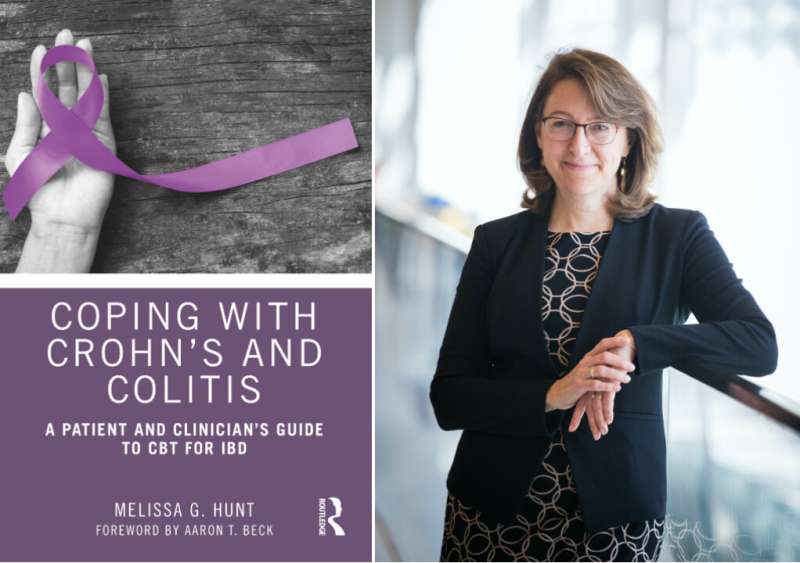A self-help guide to treating IBD

Crohn's disease and ulcerative colitis, chronic autoimmune disorders collectively known as inflammatory bowel disease (IBD), affect about 3 million Americans. They require a significant amount of medical management, sometimes including immunosuppressant medications with potentially scary side effects.
What's more, people with IBD often feel shame about their condition because of its connection to bathroom behaviors, says Penn clinical psychologist Melissa Hunt. "These are disorders that people often don't talk about even with their closest friends," she says.
Now there's a cognitive behavioral therapy (CBT) they can try at home via a new book written by Hunt called "Coping with Crohn's and colitis: A patient and clinician's guide to CBT for IBD." It includes numerous clinical examples and stories from patients, plus a full treatment protocol people can work through on their own. It also includes two hypothetical patient treatment summaries that illustrate how CBT can help people with IBD.
"When you Google 'inflammatory bowel disease,' you're three clicks away from the scariest, worst-case scenario," Hunt says. "This can lead to increased fear and anxiety. And even the most caring gastroenterologist won't have time to address all the emotional and practical challenges that come with living with an IBD." Hunt, who has studied and treated IBD and irritable bowel syndrome (IBS) for nearly two decades, knew there was a better way to help such patients.
She approached the subject in much the same way she did a 2016 book she published on IBS, conducting a randomized clinical trial on the book prior to publishing the book itself. For the IBD study, a control group received a carefully curated educational workbook sourced from publicly available information. Participants in the experiment group received a book that included the same educational material but in conjunction with CBT-specific interventions.
"For example, most people with IBD would rather be caught dead than ask to use the bathroom where public restrooms are normally not available," Hunt says. A CBT approach would mean that on a day they felt well, they'd practice doing this. "Go into one place after another and politely ask to use the bathroom, then pay attention to the outcome," she says. "Most people are going to be accommodating and kind."
The same holds true for having the conversation about IBD. "People are often resistant to telling anyone they have this disorder. They worry about being seen as immature or entitled or incompetent or unreliable or disgusting," says Hunt. "But the vast majority of people respond in a kind, empathetic, and thoughtful way."
For the first eight weeks of Hunt's study, the groups stayed separate. Then participants from the control condition received the CBT protocols, too. The research team followed everyone for an additional three months.
"The CBT worked well," Hunt says. "We found that crossing over to the real book led to substantial extra gains in things like depression, and the gains were generally maintained. Even in the face of disease flares, people were able to cope more effectively and have better a quality of life."
Not every person experiencing IBD will feel better after using a self-help book like this; some will still require the assistance of in-person therapy, but Hunt feels confident in the ability of this approach to ease symptoms and stress for many. "There are nowhere close to enough psychotherapists with GI expertise out there to even begin to answer the need," she says. "But if we can get this kind of support into people's hands early, they will have better outcomes."





















